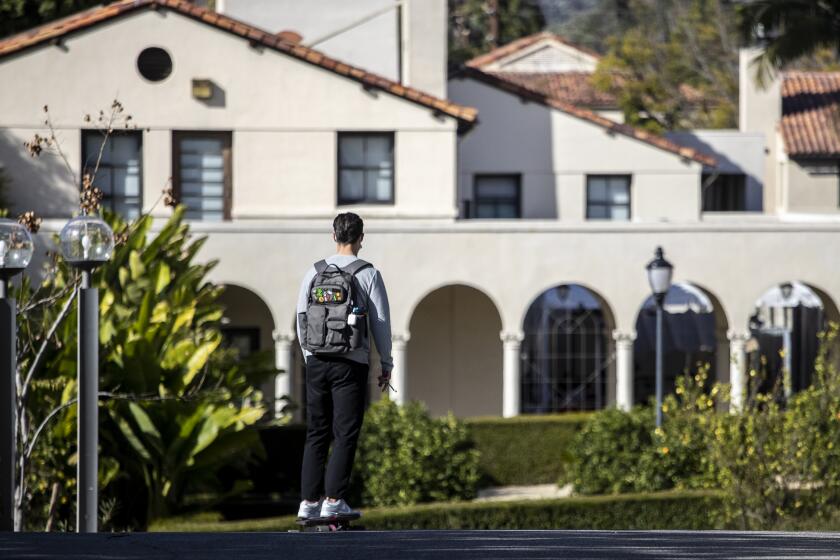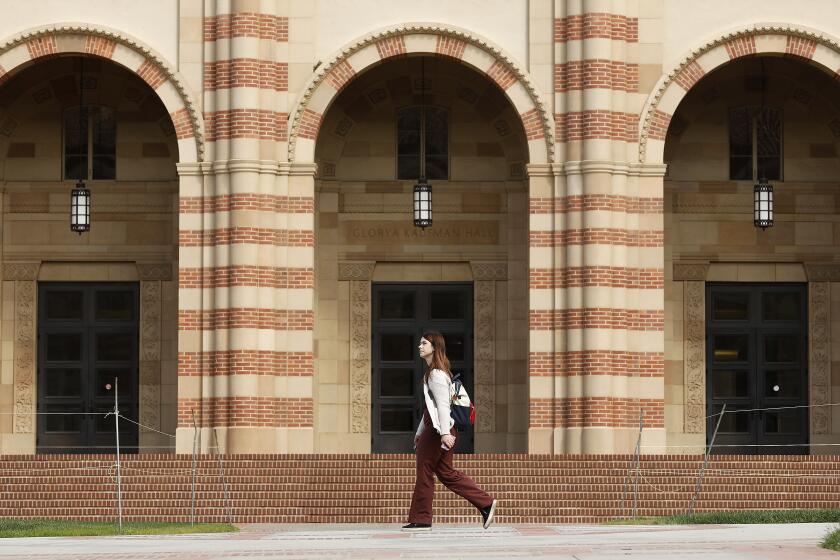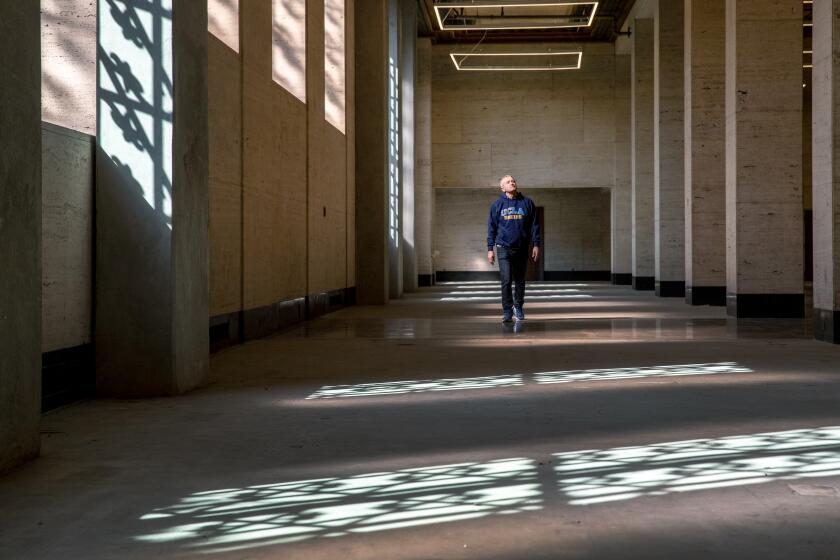UC admits record number of California first-year students for fall 2023, led by Latinos
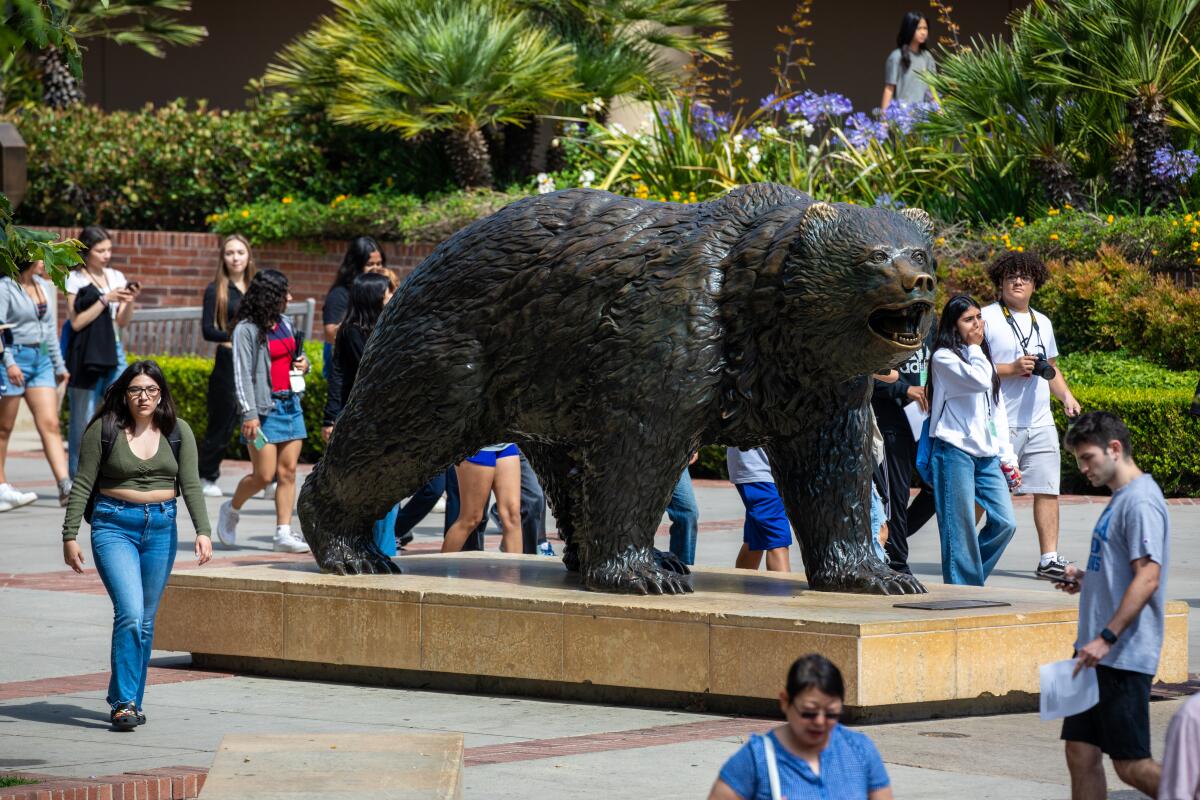
- Share via
The University of California admitted a record number of California applicants for fall 2023 — led by Latinos, who were part of the largest class of underrepresented students ever — as campuses received more funding to increase coveted seats, according to preliminary data released Tuesday.
Overall, UC admitted 88,285 Californian first-year applicants, an increase of 3.5% over last year, with gains posted at most of the nine undergraduate campuses. Admission rates inched up systemwide, to nearly 67%, and at nearly all campuses. UC Santa Cruz opened its doors most widely, accepting 10,000 more first-year students for this year over last year, a whopping 44.5% increase.
At several of the system’s most sought-after campuses, the admission rate is much lower. UCLA admitted 9.5% of California first-year applicants and UC Berkeley, 15.1%, both slightly up compared to last year.
UC campuses also increased admission offers to transfer students — even as their applications last fall declined amid plunging community college enrollments in California and throughout the nation. UC San Diego led the way, admitting 11,200 California transfer applicants, an 11% increase over last year.
Latinos were the largest group of admitted California first-year students at 38%, followed by Asians at 34%, white applicants at 19% and Black applicants at 5%. American Indians made up 1% of admitted students but grew overall with significant gains at UCLA, UC Santa Cruz and UC Santa Barbara. The system launched a major effort last year offering free tuition and fees to California residents who are members of federally recognized Native American, American Indian and Alaska Native tribes.
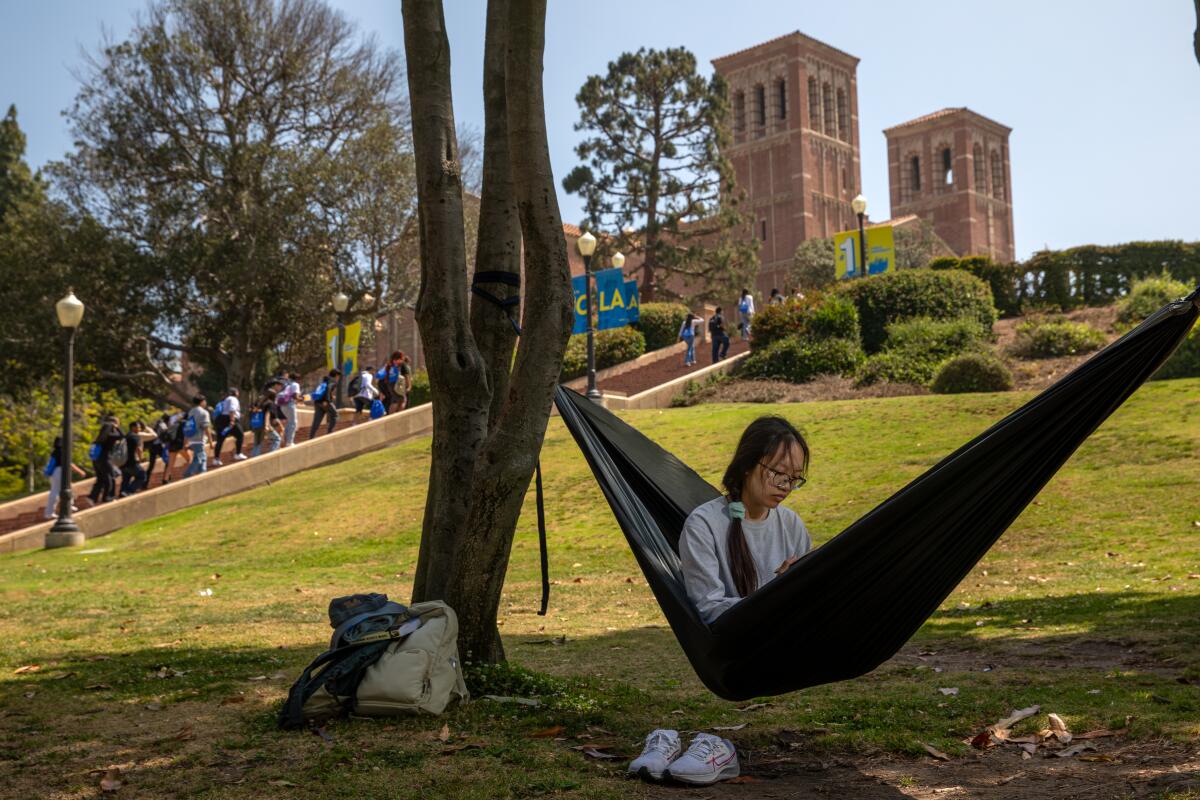
“The University’s latest admissions data reflects our commitment to expanding opportunity and to ensuring that students of all backgrounds have a chance to attend one of our excellent undergraduate campuses,” UC President Michael V. Drake said in a statement. “We’re pleased to support thousands more Californians who wish to pursue a higher education, benefiting themselves and communities across the state.”
The new data about the diversity of UC’s admitted class comes as campuses throughout the nation are faced with a ban on using race as a factor in admissions following the U.S. Supreme Court ruling in June striking down affirmative action. Overall, 44% of UC’s admitted class of first-year applicants and 37% of transfer students are members of underrepresented racial and ethnic groups, a diversity reflecting the state’s demographic shifts and more than 25 years of UC experimentation in how to create diverse classes without affirmative action.
The Supreme Court’s ban on affirmative action has triggered angst on campuses about how to promote diversity without considering race in admissions decisions.
About 45% of California admitted students are the first in their families to attend college and 47% are low-income.
“The University of California continues to set an example for our peer private and public institutions as we strive to recruit talented and diverse students from around the state,” said Han Mi Yoon-Wu, executive director of undergraduate admissions at the UC Office of the President.
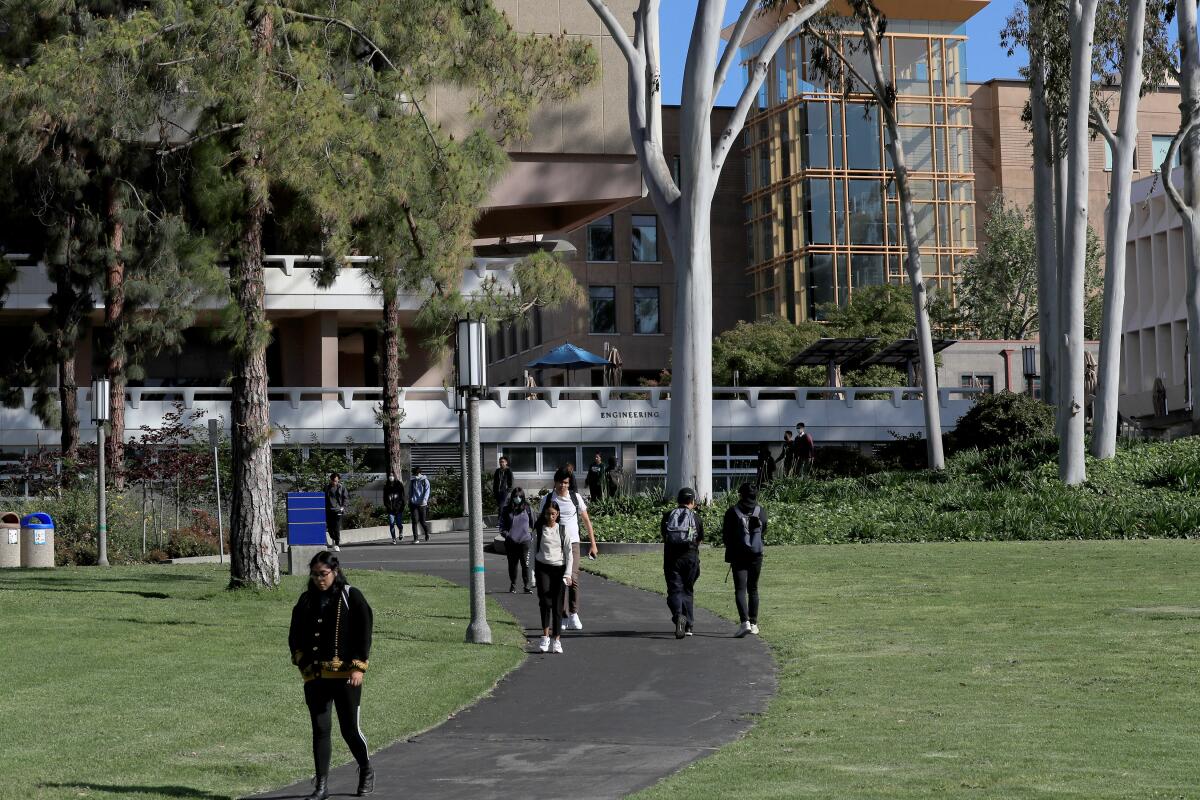
The number of admitted students from other states and countries rose over last year but was lower than 2021 levels. UC admitted 23,696 first-year students from other states, compared with 22,798 in 2022 and 28,157 in 2021. International students numbered 17,704 for fall 2023 compared with 17,531 in 2022 and 19,973 in 2021.
Following the Great Recession of 2008, several UC campuses had begun enrolling more nonresidents, who pay higher tuition, to offset major state funding cuts. UC Berkeley, for instance, increased its share of nonresident students from 9.3% in 2008 to 23.7% in 2022.
But that triggered a public outcry from Californians upset that they paid taxes to support the university system while their children were often rejected from their campuses of choice.
Drake has also unveiled a plan to increase enrollment of California students by more than 20,000 by 2030 — and possibly as many as 33,000, the equivalent of a new campus, if resources are available.
The potential enrollment increase at the University of California would be the equivalent of a new campus.
UC plans to expand enrollment of California undergraduates by 4,200 this fall under an agreement with Gov. Gavin Newsom. UCLA, UC Berkeley and UC San Diego, the three most selective campuses, also plan to swap out about 900 out-of-state and international students this fall and give those seats to Californians under a deal with Newsom and legislators who increased state funding to pay for losses in higher nonresident tuition.
That additional funding helped UC Santa Cruz, for instance, admit the largest class of California students ever.
Michelle Whittingham, UC Santa Cruz associate vice chancellor of enrollment management, said the campus plans to enroll 4,189 first-year students this fall and winter — an increase of 733 over last year — thanks to such factors as additional state funding and quicker completion of degree programs through more summer classes.
But, demonstrating the myriad factors that affect admission planning, UC Santa Cruz accepted 10,200 more students this year to hit that enrollment target. One reason, she said, was because the campus reduced by half the number of seats in the popular computer science major and increased offers in other majors where more students are likely to turn down their acceptance. Whittingham explained that officials reduced computer science slots this year after 300 more students than expected enrolled in the program last year; campus officials wanted to maintain the program quality.
Whittingham said the campus expects to honor its one-year housing guarantee to all new students — one reason it is offering winter admission to some of them.
“To see such a significant increase in access is beyond exciting,” she said.
UCLA announced plans to expand in downtown Los Angeles with the purchase of the historic Trust Building for satellite classes, a move to widen access at the nation’s most popular university and help revitalize the city’s historic core.
UCLA admitted 163 more California first-year students this year than last, with a slight rise in the admission rate to 9.5%, and fewer students from other states and countries. The share of admitted Californians from historically underrepresented groups climbed to 37% this year, the highest proportion in more than three decades.
The Westwood campus also admitted 5,665 transfer students from the community college system, a 9% increase. Overall, UCLA expects to enroll hundreds more California students this fall but does not need to appreciably increase admission offers because so many applicants accept them, officials have explained.
UC Berkeley admitted 10,994 California first-year students, an increase over last year’s 10,518, which reflected a slight rise in the admission rate to 15.1%. The campus reduced offers to students from other states and countries. The number of Black students dropped slightly but the overall number of admitted applicants from underrepresented racial and ethnic groups increased, as did first-generation and low-income students.
“Admitting more students who reflect the socioeconomic diversity of the state has been a priority for us,” said Jocelyn De Jong, UC Berkeley’s assistant vice chancellor and director of undergraduate enrollment. “We know that academic talent can be found in all communities and settings and we value bringing together a diverse class of students with different experiences and perspectives.”
UC Irvine admitted 24.6% more first-year students for fall 2023, including 2,160 more Californians, after cutting back admission offers last year, especially for out-of-state and international students. Dale Leaman, Irvine’s executive director of undergraduate admissions, said the campus plans to enroll about 700 more Californians this year — 500 first-year students and 200 transfers. Irvine also increased nonresident admissions by nearly 42% but they remain below 2021 levels.
“The real point of our efforts ... was to provide more access to Californians,” he said. “Increasing California enrollment was quite intentional; an effort to support and be responsive to systemwide and statewide interests.”
UC Santa Barbara also increased admission offers to both California and nonresident first-year students by nearly 8%. Admission offers to Latinos increased the most, by 639.
UC San Diego’s efforts in admitting more transfer students is grounded in close work with community colleges to help potential applicants clearly understand the courses required for their majors and structure their schedules to complete them on time to move to a four-year institution, campus officials said. UC San Diego is launching new efforts in the coming year with community colleges in San Diego and Imperial counties to expand that work, including adding staff and greater outreach efforts.
“We are excited that these collaborations with community colleges — especially those in the local San Diego area — are a positive addition to our relationships with these campuses and their applicants, and that we are consistently offering admission to the highest number of California Community College applicants of any UC campus,” said Jim Rawlins, associate vice chancellor of enrollment management.
More to Read
Sign up for Essential California
The most important California stories and recommendations in your inbox every morning.
You may occasionally receive promotional content from the Los Angeles Times.
